“As for the abbot or abbess, they must show the greatest possible concern with great wisdom and perseverance to avoid losing any one of the sheep committed to their care. They should be well aware that they have undertaken an office which is more like the care of the sick than the exercise of power over the healthy. They should be anxious to avoid the Lord’s rebuke to the shepherds through the Prophet Ezekiel: you made your own those you saw to be fat and healthy and cast out those who were weak. They should follow the loving example of the Good Shepherd who left ninety-nine of his flock on the mountains and went off to look for the one sheep who had strayed. So great was his compassion for the weakness of that one erring sheep that he actually lifted it onto his sacred shoulders and so carried it back to the rest of the flock.” (Rule of St. Benedict, Chapter 27, emphasis mine)
My son peed his pants at school yesterday. He still hates using the potty anywhere but at home, and he refuses to do it out and about unless Chris or I are there with him. So, the teacher called me 15 minutes before I would have left to pick him up to let me know he was “having a rough day.” I could hear him sobbing hysterically in the background. But he didn’t want to talk to me. He just wanted me to come…now.
They’re so fragile, these children. So new to the world. I remember August’s new pink skin smoothed out and puffed up in his babyhood. I remember staring at it wondering what would happen to him in this world that would break that skin open, toughen it, stretch it, wear it thin.
When he was eleven months old, he reached for a cord and pulled a curling iron down on the back of his hand. Oh, how he cried, how I cried, how his caregiver cried. The heat burned his skin, peeled it free of his body. Isn’t it amazing how that can happen? I was working at a camp that month and he was with me there, being watched by Ms Amazing, who did everything to prevent his being hurt. Yet there she was holding my boy, his face in panic, her face in panic. It was early morning, 7 am. And he and I walked together, clinging to each other around the lake as the sun rose and burned off the dew. I sang songs until he calmed. The camp doctor sealed that skin with potion, and he recovered.
Some days I look across the table at breakfast and I see his scar, an unhappy, imperfected circle of once-melted skin, and I sigh. I know what once was there, how fragile it all is: our beating hearts, our soul’s ability to feel and see and live.
So yesterday all I could see was that little boy who didn’t want to pee his pants but did, who is still learning to understand this world and his body in it and what is required socially and emotionally and physically. I brought him his blankey. By then, he was already smiling again dressed in clean clothes, blissfully disconnected from the emotion of twenty minutes prior. But I could still see him in his wandering and ache.
St. Benedict speaks in this because we are all the Abbess, we are all shepherds, perhaps to our children, to someone else’s child, to the friends in our lives, to the broken we pass by on the street. What is whispered when I see my son in all his vulnerability is the calling to an “office which is more like the care of the sick than the exercise of power over the healthy.”
How fragile we all are. How tender and new. How soft and untouched our skin.
Oh, Lord, that we might see with eyes of the Good Shepherd, those who groan in their weakness, who weep over their embarrassment, their shame, those who cannot stand on their own and need our hands under their arms so they can shuffle their lead feet.
Oh, that we might see the one sheep in our midst, the one wandering, begging to be found. That we might choose other than to be taken with the “fat and healthy” and instead run after the frailest with tender compassion.
Let’s be Abbots and Abesses, my friends. Let’s rescue.











